Architects are a highly sought after consumer set in the building materials industry. They're a little tricky to market to because the ones researching don't always have the most purchase power, and the ones with the purchase power are rarely the ones researching.
Not to mention you have the added dynamics of their clients, the builders, the general contractors and on and on.
So what do architects really want building materials manufacturers to tell them? Give them? Sell them?
We asked exactly that ... and they told us.
We asked architects what they want in building products, where they look for it and how they want it 10 different ways and we kept getting the same answers:
- Architects won't compromise on form or price. They want a high-quality product at a decent price point. They're trained to find the best products for the job, but they're also trained to stay on budget and find the best product for the value.
- Architects want to read about your past projects. Trying your product for the first time is a huge risk. One architect even described it as a liability. So if they're going to take a chance on you, they want to read about someone else who did the same and had a positive experience. We recommend having a case study that fits every instance where your product is a good fit.
- Architects. Want. Samples. It's nearly impossible to get an architect to spec your product without getting your product in their hands. Your website should be an open doorway to product samples. Offer architects multiple entry points to request a sample. Instruct your sales team to bring up samples early in their conversations. If someone is on the fence about your product, samples can seal the deal.
Demographics
60/40 Gender Split
60% of the architects in our survey were male while 40% were female.
Architecture has long been thought of as a male-dominant field, but according to our data, in the last 20 years women have been flocking to the field (and killing it!).
Experience
Architects in our survey had a pretty even spread when it comes to experience:
- 24% have 3-5 years experience
- 30% have 6-20 years experience
- 24% have 11-20 years experience
- 22% have 20 or more years.

Architecture Firm Size:
- 22% work as freelancers
- 50% work for a small to mid-size firm
- 28% work at larger firms
Firm Specializations:
Only 20% of architects said their firm concentrated in a specific type of project like restaurants or churches.

Local, National & International Projects
Although most building manufacturers sell their products at least nationwide - if not internationally - most architects are taking on projects in a closer proximity to their firm.
Nearly half of all the architects in our survey work on projects based in their local state or region. Mid-size firms are the most likely to focus on international jobs, followed by freelancers. But the largest firms concentrate strictly on their home state or region.
Your website is more important than you might think
Building Material Manufacturer's websites are the number 1 place architects research building products online.
They are more likely to come to your website than they are to search for your products on Google. Let me say that again … they are more likely to come to your website than they are to type your product category into Google!
That means that your website is your biggest opportunity to make an impression and make a sale! If your company is currently marketing or selling to architects then your website needs to be easy to navigate, well designed and filled with the information architects need (more on that in a minute).
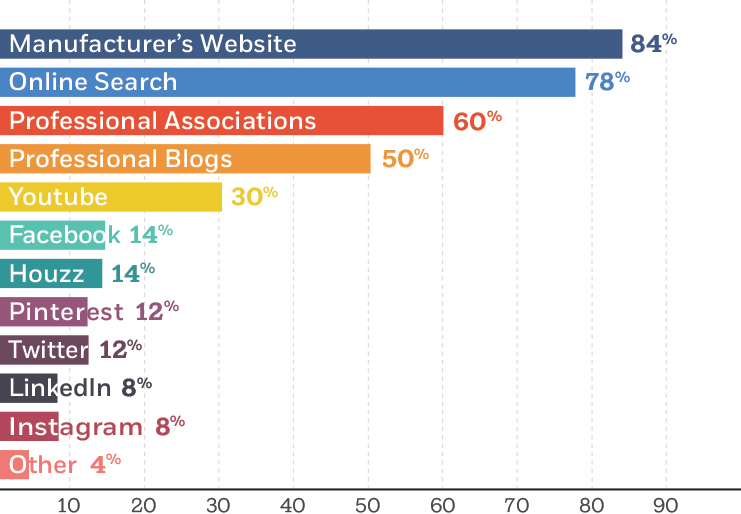
About Architects & SEO
Keywords and SEO are a tricky business. Google changes the rules all the time and it's tough (and expensive!) to get your brand to rank for single words like "siding" or "windows."
Instead, focus your efforts on long-tail keywords (which means search terms with more than 1 to 3 words). Research shows that architects are more likely to enter longer keywords like “best window glass for hospitals" or "best window glass for hospitals in cold climates” than they are to search for terms like “window glass.” That’s actually great news for you because it allows your SEO efforts to be ultra targeted, and relieves pressure from competing for search terms that may already be dominated by the biggest in the business.
(If all this SEO talk has you freaking out, check out our article on Everything You Need to Know about SEO and Keywords.)
Architects want to find 6 specific types of content on your website
Architects picked out the following list of 6 types of content as the content that is most helpful when they are researching a product to spec for the first time.
1 - Case Studies and Product Samples tied for the most helpful content they can find on your website.
2 - Downloadable AutoCad, Revit or 3D files
3 - Photos & Videos
4 - Interactive tools like calculators or product visualizers
5 - PDF Brochures
Almost 70% of architects said they find case studies to be the most helpful type of content when deciding on which products to spec. If you're looking to win more architects then you need to have a good supply of case studies that demonstrate how your products work in a variety of projects.
The same amount of architects said that being able to order samples was the most helpful piece of content on a manufacturer's website. If you're currently asking for architects to "contact us for samples," you're missing a key opportunity to capture and nurture leads and possibly missing out on sales.
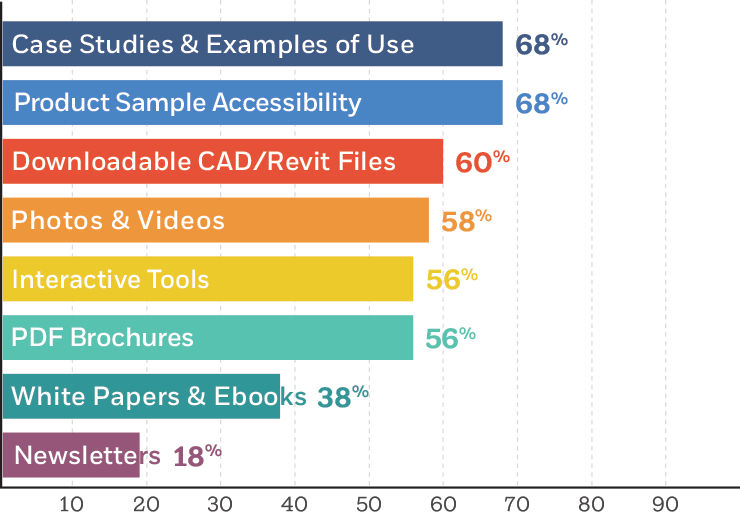
Content & The Architect's Customer Journey
I've heard from multiple sources that building materials manufacturers are notorious for over-emailing architects once they get ahold of their email address. Most manufacturers are struggling to keep communication consistent with architects who don't have a project right now but will one day soon and they want to be on the top of their mind.
These survey results can actually tell you a lot about what information to be sending to architects and when.
If you have a lead that is just opening your newsletter occasionally or even downloaded a white paper in the last couple of months - they are not ready for a sales call, and they are not ready for you to turn up the frequency of emails you're sending them. Send architects like this information that will help them but has nothing to do with asking them to purchase from you. Emails that are well timed, well spaced out and packed with high-quality content won't feel like spam.
On the other hand, architects who are reading use cases, downloading case studies and ordering samples are ready for more information about your products, so start sending them info that's relevant to what they're looking at and downloading already. Then, if they're still opening and clicking on everything, it's time for a call from their local sales rep!
What keeps Architects from Spec'ing New Products?
We asked architects "What is your number one hesitation when it comes to spec'ing a new product for the first time?"
Project spec requirements is the LEAST common factor. If an architect is deeply looking into your product, they've most likely already checked that it aligns with their project's needs. Architects don't need to be convinced that your product will fit their project specs. They can figure that out on their own.
Instead, spend your website and brochure content talking about past successes, the quality of your products, how it stands up over time, where it is and how soon they can get it. Be as specific as you can when telling architects where your products work best. List specific climates, project-types, strengths, weaknesses, etc. so architects are getting a detailed view of your product.
The more specific you are about what your product can and cannot do, the better they will feel about choosing you.
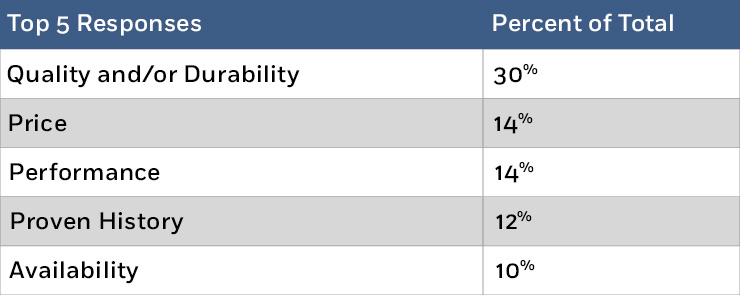
The best way to get Architects to Spec your Product for the first time
Every building materials company is on the hunt for the secret formula that will convince architects to buy from them for the first time.
And now … here it is:
We asked: What are the best ways a building materials manufacturer can get you to specify their product for the first time?
Samples are the number one way you can get an architect to specify your product for the first time.
If you aren’t making it absolutely painless for architects to get free samples through your website …
You’re losing sales.
It’s as simple as that.
One other interesting response that although had a low response rate, just 4%, some architects did say that videos were one of the best ways for building materials manufacturers to get them to spec a product for the first time. Specifically, installation videos.
And although 4% isn’t astronomical, it is worth noting that architects are looking to be able to learn everything they can about your product online, and video is an excellent way to do that.
Architects want Products that Have it All
We asked Architects:
Other than price, what factors contribute to you specifying a building materials product?
We had them rate the importance of each factor on a scale from 1-5. We then used their responses to give every factor an average score.
The results show that ... everything matters.
In fact, there is only a 1.05 point difference between the factor rated most important and the one rated least important.
Architects aren’t willing to compromise in any area - They want a high-quality product that looks good, performs well and is readily available. And, although relationships with other professionals (like the contractor or distributor) may somewhat influence their decision, ultimately what they care about is the product, not the people.
So how do you market to architects when everything matters?
Start by positioning your company as a company with high standards. Create and promote high-quality, dependable products that are always available and produced in high quantities.
Focus your communication with architects on assuring them that you know they are under a time constraint, and waiting on your products will never be an issue.
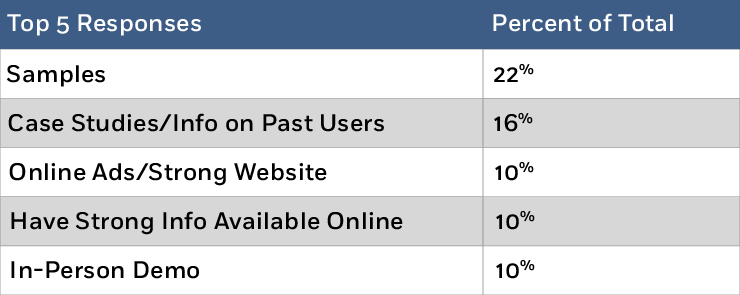
If availability is an issue
What if your products aren't available 100% of the time?
Make the scarcity work for you.
If you work with recycled materials, reclaimed wood or other rare materials, sometimes your suppliers run a little low. Don't hide this fact and hope no one specs your products during the dry season.
Face your limitations head on and instead of apologizing for it - place the burden on architects to get their specs in early before they miss their chance.
How Architects discover new products
What you're doing online officially impacts your sales.
The top two ways architects discover new products are online: through search and manufacturer websites. That means your website is no longer just a box to be checked. It's your first impression and your biggest opportunity to make a sale.
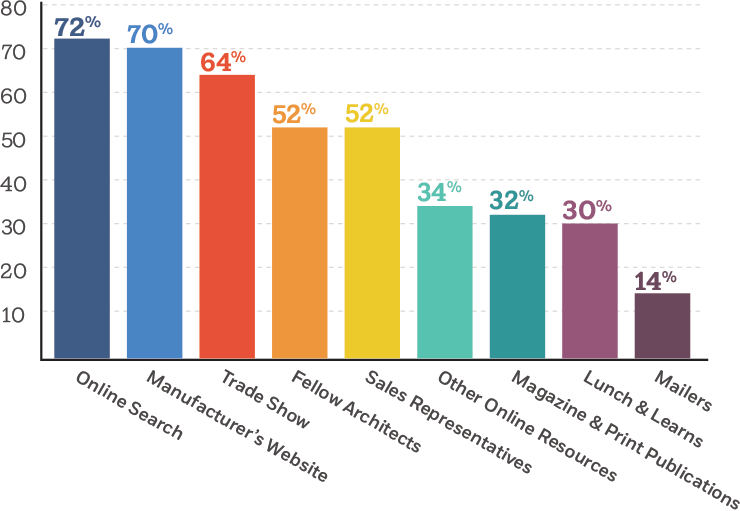
Now, let's take a deeper look at each of the top ways architects discover new products and consider some possible scenarios for each.
1. Online Search
Most likely they will be searching for a specific product for an upcoming project. If architects are using Google, they're there for one of a couple reasons:
- The product they usually use won't work on their new project
- The product they usually use failed them in the past
- They've run into a specific pain point and need a product to address it
No matter the reason, architects are searching with specific needs. You can help meet their needs better by offering case studies for the specific types of projects your products do best in - like restaurants, houses, high rises. Also, don't waste time with markety words.
2. Manufacturer Websites
There are 2 likely scenarios here.
First, they are already on your site looking at products for a current project when they discover a new product that you’ve just released or a new product that they just didn’t know you had.
Or, they come to your site because they know you make something similar to what they need, for example, they need recycled wood panelling and they know you make recycled wood flooring but they aren’t sure about wall panels.
3. Trade Shows
64% of architects discover new building materials products at trade shows.
This means 2 things:
One - the huge investment you’re putting into trade shows may actually be worth it. If you're properly engaging and following up with leads from trade shows. Which brings me to point number two ...
Two - You must have a strong follow-up strategy with architects after trade shows. At any given trade show they are discovering hundreds of new products. The only way they are going to remember to spec your product when a new project comes up is if you’ve been keeping in contact with them and nurturing them in a non-spammy way since your initial contact at the trade show.
We asked architects to tell us one thing they wish building materials manufacturers knew or understood about their job.
We received an array of responses, but a few topics stood out.
They want you to understand their professional relationships
Architects have to balance several relationships. Often, they have to defend their decision to spec your product to several other parties - including general contractors, builders and the end client.
- “We are the liaison between [manufacturers] and the customer”
- “I must depend on another party to install.”
Yes, you want to win the architect, but you also need to partner with them to help them carry your product through the sales process on their end, not just through your own.
One way to be their partner is to offer easy access to information that will speak to each of their relationships like a sales brochure for the homeowner, installation videos for builders and case studies that include testimonials from the general contractor.
They want you to understand that Price matters
Product costs came up in a number of different ways, but the most common remarks related the need for high-quality products at a reasonable cost.
- “[A] competitive market needs low-cost, high-quality materials.”
- “In many situations, cost is the overruling factor.”
Even if you can't put pricing on your website, you need to speak to pricing up front. Your website and brochure content should focus on the value of not only your product, but the solution your products solve. Problem solving is something worth paying for.
They want you to understand their need for Information
When spec'ing a product, architects have to make sure your product aligns with a lot of requirements. Several architects voiced their frustrations with the lack of available information and how difficult it is to analyze product materials or functions.
- I wish they knew that “not every material fits every project, but when it does, we need complete information about the specifications for that material.”
Architects are busy. If they can't find the information they need to know about your product quickly, they will abandon your product for a competitor who will tell them what they need to know.
They want you to know they need Samples
Samples were mentioned in several places by architects throughout the survey. Over and over again we heard that samples are an absolute must and that they are often the final factor in closing a sale:
- “Samples really increase chance of sale”
- “Samples are imperative to selling clients on a product.”
The look and feel of your product is always on the mind of your architects. Make sure you have samples available for all of your products, they ordering is easy and your follow-up strategy for architects who do order samples continues to make them feel like you are their partner, not just selling to them.
Architect's Biggest Frustration with Manufacturer Websites
Many Building Materials Manufacturers are struggling to bring their websites into the 21st century.
Just having any website is no longer enough. Architects specifically are concerned with design and aesthetics, they need very specific information, and they are under tight deadlines.
All that being said, the responses to our question “What is your biggest frustration with building materials websites?” are not surprising.
The top 5 things architects are frustrated with on manufacturer websites are:
- Navigation - Clicking through the site to find what they need often leaves them confused or frustrated.
- Content & Information - They often find that there's not enough information, the information is confusing or it isn't the content they need.
- Lack of pricing information - It's something every architect needs to know, but there are a variety of reasons it can't be posted.
- Hard to find contact information - They can't figure out who to call when they have a question.
- Site speed - The site or parts of the site take too long to load or load incorrectly.
There isn't a quick fix for appealing to architects, but there are some tried and true pieces to the puzzle that will show architects you're serious about giving them what they want and helping their projects be successful.
If you take one thing from our survey, it should be that architects need information - all of the information and as specific as it can be. They're accounting for an endless amount of variables, and the more information you can give them the more dependable your products seem.
Start by listing the specific building types where your projects do best, then add information about what other products they compliment. And even if you can't include exact pricing information, offering estimate calculators or giving direct phone numbers to your sales team can help alleviate that pain point
Videos and imagery are no longer negotiable. You need to include them on your website — a lot of them. Then, reuse them on your social media platforms, especially Facebook, YouTube and Instagram.
If you need help marketing to architects as a building materials manufacturer, Venveo can help. Start a project today and learn how Venveo helps building materials companies succeed!








